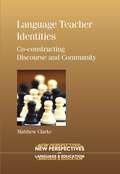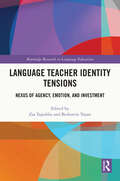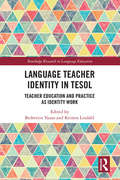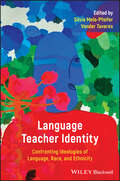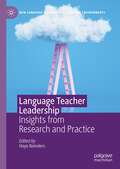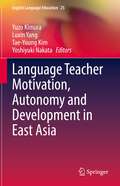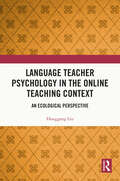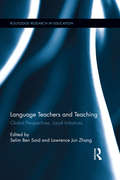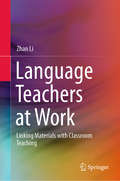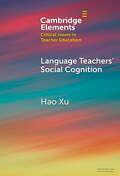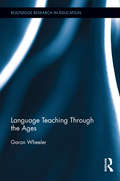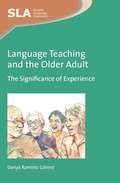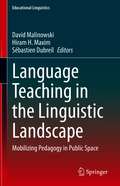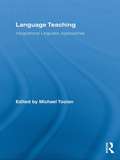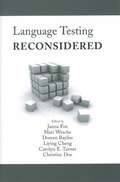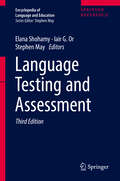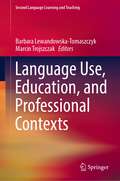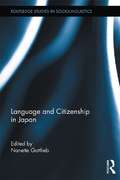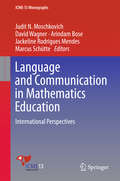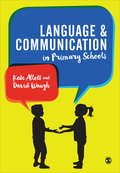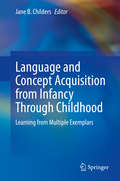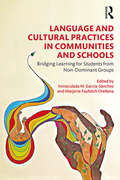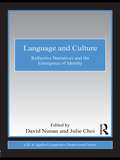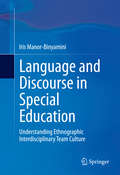- Table View
- List View
Language Teacher Identities
by Matthew ClarkeSet in the rapidly changing world of the contemporary United Arab Emirates and bringing together detailed linguistic analysis with cutting edge social theory, this book explores the development of the first cohort of students to complete a new Bachelor of Education in English language teaching, theorizing the students' learning to teach in terms of the discursive construction of a teaching identity within an evolving community of practice. Both a study of the influence of issues such as gender and nationalism in language teacher education in the Middle East, as well as of the power of discourse and community in shaping identity, this book will be of relevance to anyone working in teacher education as well as to those with an interest in theorizations of discourse and identity.
Language Teacher Identity Tensions: Nexus of Agency, Emotion, and Investment (Routledge Research in Language Education)
by Bedrettin Yazan Zia TajeddinAddressing the critical issue of teacher identity tensions, this edited volume looks at the tensions between teachers’ instructional beliefs, values, and priorities, and the contextual constraints and requirements. It examines how teachers deal with these tensions to avoid demotivation and burnout, which play a significant role in identity construction. Tensions are inseparable from growth and transformation but have the potential to disrupt teacher identity construction. Therefore, continual efforts to resolve tensions in teaching are inevitable. The process of resolution or reconciliation might be extended, and teachers could need support in that process to minimize the possible negative impacts on their identities. This process can simultaneously generate positive outcomes for teachers’ growth and learning. Therefore, how teachers perceive, respond to, and grapple with tensions are critical experiences that offer windows into the complexities of teacher identity negotiation.The volume paints a picture of the personal, professional, and political dimensions of teacher identity tensions in various international contexts. The chapters draw on empirical studies with clear pedagogical implications to illustrate what identity tensions language teachers face in and outside the classroom during their career trajectory, how language teachers cope with identity tensions in their professional life, and how teacher educators can integrate identity tensions into teacher learning activities.This book is beneficial for students and lecturers in applied linguistics, educational linguistics, and educational psychology. It will also be helpful of interest to teacher educators, teacher education researchers, teacher supervisors, and MA and doctoral students interested in research on language teacher identity.
Language Teacher Identity in TESOL: Teacher Education and Practice as Identity Work (Routledge Research in Language Education)
by Bedrettin Yazan Kristen LindahlThis volume draws on empirical evidence to explore the interplay between language teacher identity (LTI) and professional learning and instruction in the field of TESOL. In doing so, it makes a unique contribution to the field of language teacher education. By reconceptualizing teacher education, teaching, and ongoing teacher learning as a continuous, context-bound process of identity work, Language Teacher Identity in TESOL discusses how teacher identity serves as a framework for classroom practice, professional, and personal growth. Divided into five sections, the text explores key themes including narratives and writing; multimodal spaces; race, ethnicity, and language; teacher emotions; and teacher educator-researcher practices. The 15 chapters offer insight into the experiences of preservice teachers, in-service teachers, and teacher educators in global TESOL contexts including Canada, Japan, Korea, Norway, Sri Lanka, Turkey, the United Kingdom, and the United States. This text will be an ideal resource for researchers, academics, and scholars interested in furthering their knowledge of concepts grounding LTI, as well as teachers and teacher educators seeking to implement identity-oriented approaches in their own pedagogical practices.
Language Teacher Identity: Confronting Ideologies of Language, Race, and Ethnicity
by Vander Tavares Sílvia Melo‐PfeiferThe first volume to focus on race, ethnicity, and accent as elements of language teacher identity, a valuable guide for in-service teachers and teachers-in-training Language Teacher Identity presents a groundbreaking critical examination of how ideologies of race, ethnicity, accent, and immigration status impact perceptions of plurilingual teachers. Bringing together contributions by an international panel of established and emerging scholars, this important work of scholarship addresses issues related to native-speakerism, monolingualism, racism, competence, authenticity, and legitimacy while examining their role in the construction of professional identity. With an intersectional and holistic approach, the authors draw upon case studies of practical teacher experiences from Brazil, Canada, Germany, Norway, Mongolia, Pakistan, and the United States to provide teachers with real-world insights on responding to the assumptions, biases, and prejudices that students, student teachers, and teachers may bring into the classroom. Topics include the impact of policies and ideologies on teacher identity development, the intersection between L2 teacher identity and teacher emotion research, awareness of ethnic accent bullying, and the use of transraciolinguistic approaches in the classroom. This unique new work: Provides a broad overview of the different types of challenges language teachers face in their careers Focuses on race, ethnicity, plurilingualism, and accent as fundamental elements of a language teacher’s identity Discusses the sensitive political and social factors that complicate the role of a language teacher in the classroom Covers the teaching of a wide range of languages, including English, Japanese, Portuguese, French, Spanish, and Norwegian Addresses key issues and significant gaps in contemporary research on language teacher education, including the experiences of teachers of two or more languagesEmploying a variety of methodological and theoretical approaches, Language Teacher Identity is a forward-looking look at an exciting area of research and theory in language teacher education and training. It is essential reading for students training to become language teachers, in-service teachers, and for students and scholars in applied linguistics with a focus on TESOL, teacher and language education.
Language Teacher Leadership: Insights from Research and Practice (New Language Learning and Teaching Environments)
by Hayo ReindersThis edited book brings together an international cast of contributors and chapters which recognise the complexity of teacher leadership and its situated and dynamic nature. Chapters in this book are research-driven, and each reports on findings from (teacher-led and otherwise) research, synthesising the current state-of-the-art in each area. Each chapter uses illustrations of relevant practices from which lessons can be drawn. The aim is to come to a broad understanding of what best practices have emerged over the years, and where gaps still remain. Each of the chapters contributes to our understanding of how the different elements that make up teacher leadership are interconnected, with the concluding chapter synthesising these into a framework of language teacher leadership. This book will be of interest to pre-service and in-service teachers in the context of a professional learning community, as well as students and scholars of Applied Linguistics, Language Teaching and Learning, and Teacher Education.
Language Teacher Motivation, Autonomy and Development in East Asia (English Language Education #25)
by Tae-Young Kim Yuzo Kimura Luxin Yang Yoshiyuki NakataThis volume highlights unique features of L2 teachers’ motivation, autonomy and career development in Far East counties (including Japan, South Korea and China), using diverse methodological research approaches incorporating both quantitative and qualitative paradigms. While much of current research focuses on students’ psychology, this volume looks into EFL teachers’ motivation and autonomy. Both discussions of theoretical issues of teacher motivation and autonomy and practical, classroom-based investigations are included and written to appeal to researchers, as well as applied teacher audiences. The theoretical chapters give readers a solid grounding in the issues of interest to the field. The practical chapters offer cutting edge insights and can also serve as templates on which postgraduate and postdoctoral researchers can base future studies. This helps the book to offer a dual service to the research community, addressing both issues of theorization of research and the practice of conducting research investigations.
Language Teacher Psychology in the Online Teaching Context: An Ecological Perspective
by Honggang LiuEmploying a mixed-method approach, the book investigates the psychology of English as a Foreign Language (EFL) teachers in the online teaching environment in China during the COVID-19 pandemic.Specifically, questionnaires were conducted on Chinese EFL teachers to explore the profiles of EFL teachers’ anxiety, self-efficacy, buoyancy and engagement. Additionally, semi-structured interviews were used to demystify their psychological growth in the dynamic interaction with ecological environments, thus constructing an ecological model of EFL teacher psychology in online teaching. The book provides new insights into EFL teacher psychology and theoretical references for building a functional ecosystem for the professional development of EFL teachers.The book will be of interest to researchers in teacher psychology, language teachers and practitioners, especially those working in the complex technology-based educational environment, and policy makers in foreign language education.
Language Teachers and Teaching: Global Perspectives, Local Initiatives (Routledge Research in Education)
by Selim Ben Said Lawrence Jun ZhangThis volume gathers contributions from a range of global experts in teacher education to address the topic of language teacher education. It shows how teacher education involves the agency of teachers, which forms part of their identity, and which they take on when integrating into the teaching community of practice. In addition, the volume explores the teachers’ situated practice--the dynamic negotiation of classroom situations, socialization into the professional teaching culture, and "on the ground experimentation" with pedagogical skills/techniques.
Language Teachers at Work: Linking Materials with Classroom Teaching
by Zhan LiThis book examines a ubiquitous, yet under-researched, area of language education, i.e., language teachers' use of curriculum materials. It particularly focuses on EFL teachers' use of prescribed curriculum materials in higher education in Mainland China and presents a qualitative, multi-case study involving four Chinese EFL teachersand eight students (two students from each teacher’s class) at one university in Mainland China. Drawing on data from pre-lesson and post-lesson interviews with the teachers, lesson observations, and documents in three consecutive semesters at the target university, the book delineates the processes of materials useinclassroom settings. It also identifies four domains of factors that influenced the enactment of curriculum materials. Most importantly, by adopting Vygotsky’s (1978) mediation theory and Remillard’s (2005) participatory perspective, the book constructs a "curriculum enactment mediation model" to reveal the complex and mediated relations among teachers, learners, curriculum materials, and context. It also recommends practical implications for materials developers, teacher educators, administrators, and policymakers.
Language Teachers' Social Cognition (Elements in Critical Issues in Teacher Education)
by Hao XuThis Element aims to elucidate the theories of social cognition and to delineate their implications for the professional development of language teachers in primary and secondary schools. We first explore the concept of social cognition. The three key dimensions, that is, representation of social reality, social cognitive processing, and social mental abilities, of the social cognition theories are further elaborated with examples closely associated with language teaching and teacher development. We continue with more specific issues such as impression, attitude, emotion, and self-efficacy, which arise and develop as language teachers code, store, and retrieve information from social situations. We then discuss how social cognition influences teacher learning and development as observed and promoted within different social realities, and we end this Element with a call for a social-cognitive perspective on understanding language teachers' learning and development situated in diverse and changing contexts in and out of schools.
Language Teaching Through the Ages (Routledge Research in Education #93)
by Garon WheelerKonrad Koerner, a leading historian of linguistics, has long said that an academic field cannot be considered to have matured until it has history as one of its subfields. The history of linguistics is a growing area, having come into its own in the 1960s, especially after Noam Chomsky looked for historical roots for his work. In contrast, the history of language teaching has been neglected, reflecting the insecurity and youth of the field. Most works on the subject have been written by linguists for other linguists, and typically focus on a specific period or aspect of history. This volume concentrates on the basic issues, events, and threads of the history of the field - from Mesopotamia to the present - showing how a knowledge of this history can inform the practice of language teaching in the present.
Language Teaching and the Older Adult: The Significance of Experience
by Danya Ramírez GómezThe aging of the population and the increasing number of older adults pursuing foreign language courses call for a greater understanding of the ways in which these individuals learn foreign languages. This book offers a pioneering contribution to the literature on foreign language education for older adults (aged 60 and over), termed foreign language geragogy. It details an empirical, multidisciplinary study on Japanese older learners of Spanish and focuses on the influence of learning experiences on vocabulary learning strategy use. It discusses the constraints that preconceptions impose on learners, researchers, instructors and administrators, and it offers a set of practical recommendations for foreign language activities for elderly individuals. It also introduces the notion of 'learner re-training', an instructional mechanism that contributes to older learners' self-acknowledgment and autonomy development in foreign language learning. The book is directed at teachers and trainee teachers of foreign languages to older adults, and also at education professionals and researchers in the field of foreign language learning in general.
Language Teaching in the Linguistic Landscape: Mobilizing Pedagogy in Public Space (Educational Linguistics #49)
by David Malinowski Hiram H. Maxim Sébastien DubreilThis book builds upon the growing field of Linguistic Landscape in order to demonstrate the power of a spatialized approach to language, culture, and literacy education as it opens classrooms and cultivates new competencies. The chapters develop major themes, including re-imagining language curricula, language classrooms, and schoolscapes in dialogue with the heteroglossic discourses of the local; developing L2 learners’ symbolic, translingual competencies through engagement with situated, multimodal texts; fostering critical social awareness through language study in the linguistic landscape; expanding opportunities for situated L2 reading and writing; and cultivating language students’ capacities for engaged scholarship and research in out-of-class contexts.By exploring the pedagogical possibilities of place-based approaches to literacy development, this volume contributes to the reimagining of language education through the linguistic landscape.
Language Teaching: Integrational Linguistic Approaches (Routledge Advances in Communication and Linguistic Theory)
by Michael ToolanThis book demonstrates the relevance of an integrational linguistic perspective to a practical, real-world need, namely the learning of languages. Integrational linguistics’ shunning of both realist and structuralist theories of language, its commitment to an unwavering attention to the perspective of the language user, and its adherence to a semiology in which signs are the situated products of interactants interpretive behaviour, mean that it radically reconceptualizes language learning and language teaching. Detractors have implied that IL is so ‘philosophical’ or ‘theoretical’ an exercise that it has no useful bearing on the practical problems of language learning. These papers refute that misconception by demonstrating how an IL stance can help disentangle the conflicting considerations and contradictory assumptions that arise in a host of language teaching situations: first, second- and foreign-language classrooms in a diversity of settings (including India, Australia, the United States, and Hong Kong), with different age-groups of students, whether the focus is on speech or writing, and in more informal settings.
Language Testing Reconsidered (Actexpress)
by Janna Fox Mari Wesche Doreen BaylissLanguage Testing Reconsidered provides a critical update on major issues that have engaged the field of language testing since its inception. Anyone who is working in, studying or teaching language testing should have a copy of this book. The information, discussions, and reflections offered within the volume address major developments within the field over the past decades, enlivened by current "takes" on these issues. The real value of this collection, however, lies in its consideration of the past as a means of defining the future agenda of language testing.
Language Testing and Assessment
by Stephen May Elana Shohamy Iair G. OrIn this third, fully revised edition, the 10 volume Encyclopedia of Language and Education offers the newest developments, including an entirely new volume of research and scholarly content, essential to the field of language teaching and learning in the age of globalization. In the selection of topics and contributors, the Encyclopedia reflects the depth of disciplinary knowledge, breadth of interdisciplinary perspective, and diversity of socio-geographic experience in the language and education field. Throughout, there is an inclusion of contributions from non-English speaking and non-western parts of the world, providing truly global coverage. Furthermore, the authors have sought to integrate these voices fully into the whole, rather than as special cases or international perspectives in separate sections. The Encyclopedia is a necessary reference set for every university and college library in the world that serves a faculty or school of education, as well as being highly relevant to the fields of applied and socio-linguistics. The publication of this work charts the further deepening and broadening of the field of language and education since the publication of the first edition of the Encyclopedia in 1997 and the second edition in 2008.
Language Use, Education, and Professional Contexts (Second Language Learning and Teaching)
by Barbara Lewandowska-Tomaszczyk Marcin TrojszczakThis present book addresses language and its diverse forms in an array of professional and practical contexts. Besides discussing the intricacies of specialized settings such as legal, medical, technical or corporate, the collection also focuses on the role of education in relation to professional contexts ranging from challenges in professional university teaching and translation didactics to business environment requirements.
Language and Citizenship in Japan (Routledge Studies in Sociolinguistics)
by Nanette GottliebThe relationship between language and citizenship in Japan has traditionally been regarded as a fixed tripartite: ‘Japanese citizenship’ means ‘Japanese ethnicity,’ which in turn means ‘Japanese as one’s first language.’ Historically, most non-Japanese who have chosen to take out citizenship have been members of the ‘oldcomer’ Chinese and Korean communities, born and raised in Japan. But this is changing: the last three decades have seen an influx of ‘newcomer’ economic migrants from a wide range of countries, many of whom choose to stay. The likelihood that they will apply for citizenship, to access the benefits it confers, means that citizenship and ethnicity can no longer be assumed to be synonyms in Japan. This is an important change for national discourse on cohesive communities. This book’s chapters discuss discourses, educational practices, and local linguistic practices which call into question the accepted view of the language-citizenship nexus in lived contexts of both existing Japanese citizens and potential future citizens. Through an examination of key themes relating both to newcomers and to an older group of citizens whose language practices have been shaped by historical forces, these essays highlight the fluid relationship of language and citizenship in the Japanese context.
Language and Communication in Mathematics Education: International Perspectives (ICME-13 Monographs)
by David Wagner Judit N. Moschkovich Arindam Bose Jackeline Rodrigues Mendes Marcus SchütteThis book considers some of the outstanding questions regarding language and communication in the teaching and learning of mathematics – an established theme in mathematics education research, which is growing in prominence. Recent research has demonstrated the wide range of theoretical and methodological resources that can contribute to this area of study, including those drawing on cross-disciplinary perspectives influenced by, among others, sociology, psychology, linguistics, and semiotics. Examining language in its broadest sense to include all modes of communication, including visual and gestural as well as spoken and written modes, it features work presented and discussed in the Language and Communication topic study group (TSG 31) at the 13th International Congress on Mathematical Education (ICME-13). A joint session with participants of the Mathematics Education in a Multilingual and Multicultural Environment topic study group (TSG 32) enhanced discussions, which are incorporated in elaborations included in this book. Discussing cross-cutting topics it appeals to readers from a wide range of disciplines, such as mathematics education and research methods in education, multilingualism, applied linguistics and beyond.
Language and Communication in Primary Schools
by David Waugh Kate AllottLanguage and communication are essential in the classroom: essential in children’s learning, essential in teachers’ communication with children, and essential in children’s understanding of themselves and their world. This book is a guide for trainee and beginning teachers on how to support and develop talk in the classroom. It explores the theory behind the teaching of language and communication skills and includes lots of practical advice on how to translate this into the classroom. It tackles the challenges and issues of managing talk in the classroom setting, and explores the role of language in children’s learning. The book addresses the challenge of language difficulties and delayed language development among children entering school. The crucial role of adults in supporting early language development is explained, and the book also considers the needs of children for whom English is an additional language.
Language and Communication in Primary Schools
by David Waugh Kate AllottLanguage and communication are essential in the classroom: essential in children’s learning, essential in teachers’ communication with children, and essential in children’s understanding of themselves and their world. This book is a guide for trainee and beginning teachers on how to support and develop talk in the classroom. It explores the theory behind the teaching of language and communication skills and includes lots of practical advice on how to translate this into the classroom. It tackles the challenges and issues of managing talk in the classroom setting, and explores the role of language in children’s learning. The book addresses the challenge of language difficulties and delayed language development among children entering school. The crucial role of adults in supporting early language development is explained, and the book also considers the needs of children for whom English is an additional language.
Language and Concept Acquisition from Infancy Through Childhood: Learning from Multiple Exemplars
by Jane B. ChildersThis book examines the role of experience-based learning on children’s acquisition of language and concepts. It reviews, compares, and contrasts accounts of how the opportunity to recognize and generalize patterns influences learning. The book offers the first systematic integration of three highly influential research traditions in the domains of language and concept acquisition: Statistical Learning, Structural Alignment, and the Bayesian learning perspective. Chapters examine the parameters that constrain learning, address conditions that optimize learning, and offer explanations for cases in which implicit exemplar-based learning fails to occur. By exploring both the benefits and challenges children face as they learn from multiple examples, the book offers insight on how to better able to understand children’s early unsupervised learning about language and concepts. Topics featured in this book include:Competing models of statistical learning and how learning might be constrained by infants’ developing cognitive abilities.How experience with multiple exemplars helps infants understand space and other relations.The emergence of category-based inductive reasoning during infancy and early childhood.How children learn individual verbs and the verb system over time. How statistical learning leads to aggregation and abstraction in word learning.Mechanisms for evaluating others’ reliability as sources of knowledge when learning new words.The Search for Invariance (SI) hypothesis and its role in facilitating causal learning. Language and Concept Acquisition from Infancy Through Childhood is an essential resource for researchers, clinicians and related professionals, and graduate students in infancy and early child development, applied linguistics, language education, child, school, and developmental psychology and related mental health and education services.
Language and Cultural Practices in Communities and Schools: Bridging Learning for Students from Non-Dominant Groups
by Inmaculada M. García-Sánchez Marjorie Faulstich OrellanaDrawing on sociocultural theories of learning, this book examines how the everyday language practices and cultural funds of knowledge of youth from non-dominant or minoritized groups can be used as centerpoints for classroom learning in ways that help all students both to sustain and expand their cultural and linguistic repertoires while developing skills that are valued in formal schooling. Bringing together a group of ethnographically grounded scholars working in diverse local contexts, this volume identifies how these language practices and cultural funds of knowledge can be used as generative points of continuity and productively expanded on in schools for successful and inclusive learning. Ideal for students and researchers in teaching, learning, language education, literacy, and multicultural education, as well as teachers at all stages of their career, this book contributes to research on culturally and linguistically sustaining practices by offering original teaching methods and a range of ways of connecting cultural competencies to learning across subject matters and disciplines.
Language and Culture: Reflective Narratives and the Emergence of Identity (ESL & Applied Linguistics Professional Series)
by David NunanThis state-of-the-art exploration of language, culture, and identity is orchestrated through prominent scholars’ and teachers’ narratives, each weaving together three elements: a personal account based on one or more memorable or critical incidents that occurred in the course of learning or using a second or foreign language; an interpretation of the incidents highlighting their impact in terms of culture, identity, and language; the connections between the experiences and observations of the author and existing literature on language, culture and identity. What makes this book stand out is the way in which authors meld traditional ‘academic’ approaches to inquiry with their own personalized voices. This opens a window on different ways of viewing and doing research in Applied Linguistics and TESOL. What gives the book its power is the compelling nature of the narratives themselves. Telling stories is a fundamental way of representing and making sense of the human condition. These stories unpack, in an accessible but rigorous fashion, complex socio-cultural constructs of culture, identity, the self and other, and reflexivity, and offer a way into these constructs for teachers, teachers in preparation and neophyte researchers. Contributors from around the world give the book broad and international appeal.
Language and Discourse in Special Education
by Iris Manor-BinyaminiThis book examines the words and discourse as well as their meaning and impact on the everyday culture of a multidisciplinary team at a school for students with mental disabilities. The book examines the organizational, social, professional, and emotional experiences of team members from such disciplines as child and school psychology, special education, therapy (e. g. , occupational, speech), social work, and pediatric medicine within a special education school. It explores the ways in which team members describe and interpret the day-to-day requirements of working effectively in a special education school, using their own language and discourse from a subjective point of view. In addition, the book analyzes and interprets the influence of language and discourse on the outlook, behavior patterns, and the coping of team members working in the school with the students, among themselves as a team, and with the difficulties and dilemmas that concern them as well the solutions that they themselves introduce for all these issues. This book, with its focus on the unique and complex work environment of the multidisciplinary special education team, is essential reading for researchers, professionals, and graduate students in child and school psychology, therapeutic disciplines (e. g. , occupational, speech), social work, pediatric medicine, and allied mental health and medical fields.
